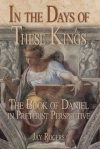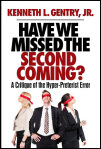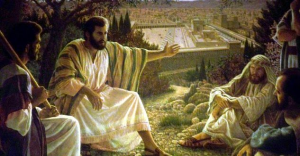Kenneth L. Gentry Jr.'s Blog, page 35
July 15, 2022
CHRISTIANITY’S FIRST SUFFERING
PMW 2022-055 by Kenneth L. Gentry, Jr.
I am continuing a response to the claim that God has called the church to be a suffering church throughout her history. Though the church certain has suffered in her past and does suffer in the present. . . . And though she must suffer in patient faithfulness. . . . She is not called to always suffer on earth. She is faithfully suffering unto glory. Her time of victory will come before the end.
Let us now look at some other verses deemed to require that the church be always and only a suffering community.
Philippians 3:10
Here Paul writes: “That I may know him, and the power of his resurrection, and the fellowship of his sufferings, being made conformable unto his death.” Gaffin comments: “Paul is saying, the power of Christ’s resurrection is realized in the sufferings of the believer; sharing in Christ’s sufferings is the way the church manifests his resur-rection-power. Again, as in 2 Corinthians 4:10–11, the locus of eschatological life is Christian suffering” (Gaffin in Barker, Theonomy, 213). But is Paul referring to universal suffering that is contrary to postmillennialism? Is Christ’s resurrection-power limited to upholding believers in times of persecutional suffering?
THINE IS THE KINGDOM (Ken Gentry, editor)
Thine is the Kingdom lays the scriptural foundation for a biblically-based, hope-filled postmillennial eschatology, while showing what it means to be postmillennial in the real world. The book is both an introduction to and defense of the eschatology of victory. Chapters include contemporary writers Keith A. Mathison, William O. Einwechter, Jeffrey Ventrella, and Kenneth L. Gentry, Jr., as well as chapters by giants of the faith Benjamin B. Warfield and J. A. Alexander.
https://www.kennethgentry.com/thine-is-the-kingdom-book/
See more study materials at: www.KennethGentry.com
Again, we must understand his statements in terms of Paul’s present condition: He is writing from prison (Php 1:7, 13). As with the case in 2 Corinthians 4, and as Davidson notes regarding Philippians 3, “verses 4–11 are a biographical passage” (New Bible Commentary, 1030). As such, his insights will apply to others when they suffer for Christ; his insights do not necessarily require that Christians will always suffer persecution.
Romans 8:17
This verse reads: “If so be that we suffer with him, that we may be also glorified together.” Gaffin comments: “This correlation of future glory and present suffering is a prominent concern in the section that follows. At least two points are worth noting about ‘our sufferings’ (v. 18): (1) their nature/breadth and (2) their terminus” (i.e., the resurrection) (Gaffin, “Theonomy and Eschatology,” 213).
But against Gaffin I would note that this passage concludes Paul’s argument in Romans 6–7. Romans 6 and 7 deal with the internal struggle of the Christian against indwelling sin, not the public buffeting of the Christian against external persecution. Postmillennialism does not expect a time in history wherein we will no longer have a sin nature. As John Murray notes on this verse: “Christian suffering ought not to be conceived of too narrowly. In the passages so far considered, and elsewhere in the New Testament (e.g., 2Co 1:5–10; 1 Pe 4:12–19), suffering includes but is more than persecution and martyrdom” (Murray, Romans, 1:213).
Even the next reference to suffering by Paul refers to the decaying condition of the natural world (Ro 8:19) and is not tied to persecutional suffering by opponents of Christianity. Although postmillennialism teaches life expectancy will increase over time (Isa 65:17–21), it also holds that death remains throughout the kingdom era (Isa 65:20; 1Co 15:26). The sufferings of Romans 8 are not evidences against postmillennialism, which promises the elimination of persecutional suffering for the faith. Even as Christ’s kingdom advances in the world, at its glorious height it will be but a pale reflection of the glory of our total liberty in the resurrection when we possess a glorified, eternal body.
I will continue my response to the suffering church argument in my next article. You will just have to suffer patiently until I return!
Charismatic Gift of Prophecy
(by Ken Gentry)
A rebuttal to charismatic arguments for the gift of prophecy continuing
in the church today.
See more study materials at: www.KennethGentry.com
July 12, 2022
WHAT IS “SUFFERING”?
 PMW 2033-054 by Kenneth L. Gentry, Jr.
PMW 2033-054 by Kenneth L. Gentry, Jr.
I am continuing a postmillennial response to the evangelical claim that the church is called to suffer in history. If so, this would undermine the postmillennial hope. Postmillennial victory cannot be true if the church is always to suffer.
Now we must note:
Persecution is serious external oppression
As we reflect on this point in the debate we must bear in mind a vitally important matter: The only kind of suffering that contradicts post-millennialism is suffering rooted in dangerous external threats and oppression (especially when designed to suppress or punish the Christian faith). The New Testament era Christians are indeed a suffering people, enduring “threats and murder” (Ac 9:1–2), capital punishment (Ac 7:59; 12:1–2), and imprisonments and beatings (2Co 11:23–25), while being made a “public spectacle” and having their “property seized” (Heb 10:32–34). And were these conditions to continue until the end, postmillennialism could not be true.
If amillennialists claim the church is under persecutional suffering here in America, then we effectively discount the grievous nature of our early forefathers’ persecution, while exaggerating our own trials. [1] Reading Foxe’s Book of Martyrs (1563) quickly shows us how much better our condition is today. And since the end has not yet come, what if our (imperfect but welcome) advantageous conditions here in America were to spread throughout all the world? We know from our experience that Christianity can exist in a large-scale, long-lasting external peace from persecutional suffering.
Covenantal Theonomy
(by Ken Gentry)
A defense of theonomic ethics against a leading Reformed critic
See more study materials at: www.KennethGentry.com
Persecution does not always prevail
Remembering the form of persecution highlighted above, I am always surprised to hear amillennialists overstate their case when arguing that we as disciples of Christ “cannot expect anything other than oppression and persecution” (Strimple in Bock, Three Views on the Millennium, 63). Moule well notes what we all know from history: “No attentive observer can doubt that many and many a loving and humble disciple, called to lead a quiet life before the Lord in the ‘sequestered vale,’ ‘serves his generation’ with faithful diligence, and passes at last to rest, encountering scarcely one perceptible collision on the way” (Moule, Studies in II Timothy, 117).
The conditions in which Strimple himself lives contradict his bold claim. Is Strimple suffering in a way proving his point? Were his circum-stances as Professor of Systematic Theology at Westminster Theological Seminary that bad? Is his retirement really not what he had hoped it would be? If persecutional suffering is the “fundamental aspect of the church’s existence” of which nothing “is more basic to its identity,” then those of us living in America should not be identified with Christ as members of his church (Gaffin in Barker and Godfrey, Theonomy, 210–11). Where are we in America being imprisoned for our faith, being torturously beaten for our convictions, and being persecuted to death?
AMILLENNIALISM V. POSTMILLENNIALISM DEBATE (DVD)
Formal, public debate between Dr. Richard Gaffin (Westminster Theological Seminary) and Kenneth Gentry at the Van Til Conference in Maryland. Each debater opens with a 40 minute positive presentation and then engage in cross-examination. (Over 2 1/2 hours)
See more study materials at: www.KennethGentry.com
Truly then, the persecution the church has experienced in history does not undercut the postmillennial hope. But there is more, and I will continue responding to the suffering church argument in my next blog. Until then, you will have to remain a suffering Christian.
Notes
1. My statement must not be construed to mean that the American condition illustrates the height of the postmillennial glory, as if our condition were all that marvelous. Nor should it suggest my blindness to the genuine suffering of Christians in many places in the world still today, especially in Islamic countries. Nowhere does postmillennialism claim that by the year 2014 the full gospel glory will be won. Until history ends postmillennialism cannot be disproved on an analysis of world conditions. In fact, most postmillennialists would agree with Warfield that “the church of the twentieth century [is] still the primitive church,” a church in its infancy. Benjamin B. Warfield, “Are They Few That be Saved?, in Warfield, Biblical and Theological Studies, 347.
July 8, 2022
QUICK ARGUMENT FOR REVELATION’S EARLY DATE
 PMW 2022-052 by Kenneth L. Gentry, Jr.
PMW 2022-052 by Kenneth L. Gentry, Jr.
Introduction
Revelation 17:8–10 is an important passage that helps us determine the date in which John composed Revelation. That passage reads as follows:
[17:8] The beast that you saw was, and is not, and is about to come up out of the abyss and go to destruction. And those who dwell on the earth, whose name has not been written in the book of life from the foundation of the world, will wonder when they see the beast, that he was and is not and will come. [17:9] Here is the mind which has wisdom. The seven heads are seven mountains on which the woman sits, [17:10] and they are seven kings; five have fallen, one is, the other has not yet come; and when he comes, he must remain a little while.
Since there is a serious debate over the dating of Revelation, and since we are in one of the passages that offers us evidence for its date (Rev. 15–19), I thought I would introduce you to the debate.
Awareness of the debate is significant for a number of reasons. I believe that our recognition of the matter will help us understand an important issue. And that issues is: the writers of Scripture were real writers who wrote to real people in the real world. The Bible did not drop down from heaven as an other-worldly document. We must understand the historical significance of the books of Scripture so that we avoid mysticism and fanaticism. Christianity is an historical religion.
Before Jerusalem Fell
(by Ken Gentry)
Doctoral dissertation defending a pre-AD 70 date for Revelation’s writing. Thoroughly covers internal evidence from Revelation, external evidence from history, and objections to the early date by scholars.
See more study materials at: www.KennethGentry.com
In the process of our study of Scripture we can detect evidence for the life-settings of the books. I believe that this helps the Bible to become more “alive” for us. The biblical books were not written as mystical experiences detached from the real world circumstances of the original audience.
Furthermore, understanding when an author wrote something can often throw additional light on its proper interpretation.
As we begin, we should note that the two leading time-frames that evangelical scholars offer for Revelation are:
1. The early date (prior to the destruction of the temple in AD 70);
2. The late date (toward the end of the reign of Caesar Domitian around AD 95–96).
The early date was the dominant view in the 1700s–1800s. Whereas in the early 1900s the tide shifted to adoption of the late date. However, the early date is beginning to make a resurgence among scholars.
Revelation 17:9–10
In the perplexing vision found in Rev. 17:1–6, John is shown a harlot riding on a seven-headed beast. John is befuddled by the vision, for in Rev. 17:6b–7 we read:
[17:6] And I saw the woman drunk with the blood of the saints, and with the blood of the witnesses of Jesus. When I saw her, I wondered greatly. [17:7] And the angel said to me, “Why do you wonder? I will tell you the mystery of the woman and of the beast that carries her, which has the seven heads and the ten horns.”
So as we begin our analysis, I will build the case for the early date that is argued from this passage.
The Early Date of Revelation and the End Times: An Amillennial Partial Preterist Perspective
By Robert Hillegonds
This book presents a strong, contemporary case in support of the early dating of Revelation. He builds on Before Jerusalem Fell and brings additional arguments to bear.
See more study materials at: www.KennethGentry.com
First, we should realize that this section does not contain further perplexing visionary information. Rather, it is expressly designed to explain to John the vision he has just seen: “I will tell you the mystery” (v. 7). Then as he begins to explain the vision, he adds: “Here is the mind which has wisdom” (v. 9). And in the process, the angel’s explanation helps us to look behind the scenes to discover when John wrote.
Second, we must note that all scholars hold that John was writing at sometime during the Roman empire and that he wrote in the first century of Rome’s history. This ties us to a general period that spans only 100 years. This is an advantage for Revelation commentators that Daniel commentators do not have. Arguments for Daniel’s date range from 600 BC to 160 BC. This is an extremely wide variation.
Third, we must note that the beast image itself gives us a clue as to what kings are in view. For we read of the beast with seven heads that the heads represent both mountains (or hills) and kings. Since John wrote in the first century during the days of the Roman empire, this provides us with an important clue. We are led to ask: what city is known as sitting on seven hills? That is easy to answer: Rome. The famous seven hills of Rome are the Palatine, Aventine, Caelian, Esquiline, Viminal, Quirinal, and Capitoline hills.
The Roman writers Suetonius and Plutarch make reference to the first century festival in Rome called Septimontium, i.e. the feast of “the seven hilled city.” Archaeologists have discovered the Coin of Vespasian (emperor A.D. 69–79) picturing the goddess Roma as a woman seated on seven hills. In the coin posted above, we see seven hills behind Roma, and she is sitting on the seventh:
The famed seven hills of Rome are mentioned time and again by ancient pagan writers such as Ovid, Claudian, Statius, Pliny, Virgil, Horace, Propertius, Martial, and Cicero. The seven hills are mentioned by such Christian writers as Tertullian and Jerome.
Thus, this vision is linked to Rome of the first century. But we must go further.
Fourth, the angel teaches John something he would not naturally realize: the seven heads have a two-fold referent. They represent not only hills/mountains but also kings. So now we must look at first-century history for a line of seven kings that is associated with the city of Rome. This is where we find evidence for the early date prior to Jerusalem’s destruction.
Notice v. 10:
“They are seven kings; five have fallen, one is, the other has not yet come; and when he comes, he must remain a little while.”
Thus, when John writes, five of the seven kings have already fallen; they are dead and in the past. But the sixth one is currently reigning, he “is” (“one is”). And the seventh one lies off in the future: “he has not yet come.” Who could these be? Let’s get one other piece of evidence before us.
Fifth, note that the seventh “has not yet come,” but “when he comes, he must remain a little while.” This distinguishes the seventh king from the preceding six kings, the sixth of whom is now reigning.
This fits perfectly with what we know of the opening line of Caesars:
1. Julius Caesar (49-44 B.C.)
2. Augustus Caesar (31 B.C.-A.D. 14)
3. Tiberius Caesar (A.D. 14-37)
4. Gaius Caesar, also called “Caligula” (A.D. 37-41)
5. Claudius Caesar (A.D. 41-54)
6. Nero Caesar (A.D. 54-A.D. 68)
7. Galba Caesar (June, A.D. 68 to January 15, A.D. 69)
We can find these first emperors in the Roman historian Suetonius’ The Lives of the Twelve Caesars. He lists that twelve emperors up to his time in the early second century.
Note that these seven Caesars are the first emperors of the Roman empire (and are thus significant). Prior to them, Rome was a Republic. Julius Caesar set in motion the empire. He was so important for the empire that his name became a title that effectively functioned to mean “emperor.” The emperors of Rome all took his name as their title.
Sixth, now we should note that the first five “have already fallen.” That is, as John writes the first five are already dead. But the current Caesar is Nero, the one who now “is.” But one more in the vision’s enumeration must come soon. That would be Galba Caesar. And he must reign only briefly, for the angel informs John: “and when he comes, he must remain a little while” (v. 10b).
When we compare Galba (the seventh emperor of Rome) to all the preceding ones, he is the only one who reigns less than a year. He reigns only a six months (June, A.D. 68 to January 15, A.D. 69). And interestingly, he is the first emperor not to be related somehow to Julius Caesar, the others being adopted into the line of Caesars by formal, legal action.
Thus, first-century Roman history fits the angelic explanation of the vision. Consequently, John wrote Revelation while Nero was on the throne. And he dies in AD 68 as the empire erupts into the devastating civil war that will result in the famed “Year of the Four Emperors.” When Nero dies, three emperors lay claim to the emperorship but last only a few months each: Galba, Otho, and Vitellius.
Conclusion
Other lines of “internal” evidence appear in Revelation. Especially important is the reference to the Jewish temple in Rev. 11:1–2. This material is obviously picked up from Jesus’ teaching in Luke 21:24. Notice how similar they are:
Rev. 11:1-2
[11:1] Then there was given me a measuring rod like a staff; and someone said, “Get up and measure the temple of God and the altar, and those who worship in it. [11:2] Leave out the court which is outside the temple and do not measure it, for it has been given to the nations; and they will tread under foot the holy city for forty-two months.”
Luke 21:24
[21:20: “But when you see Jerusalem surrounded by armies, then recognize that her desolation is near…. [21:24] And they will fall by the edge of the sword, and will be led captive into all the nations; and Jerusalem will be trampled under foot by the Gentiles until the times of the Gentiles are fulfilled.
Jerusalem = the holy city
Gentiles (ethne) = nations (ethnesin)
trampled underfoot (patoumene) = tread under foot (patesousin)
I believe that these two pieces of evidence strongly anchor Revelation’s history in the sixties of the first century. The evidence from Rev. 17 is particularly instructive.

July 5, 2022
JESUS WAS A PRETERIST (3)
 PMW 2022-052 by Kenneth L. Gentry, Jr.
PMW 2022-052 by Kenneth L. Gentry, Jr.
This is the final article in a three-part response to Dr. Wayne Briddle of Liberty University. He presented a paper critiquing orthodox preterism and asked me to reply. These articles represent my reply.
Matthew 10:23
As I noted (too briefly!) at the ETS meeting, I disagree with Dr. Briddle’s observation (drawn from Toussaint) in his third paragraph. He states: “At the time that Jesus sent out his apostles, he was enjoying great popularity. There is no evidence that the apostles were in this kind of danger until after the crucifixion of Christ.” I disagree with this on several grounds:
(1) Even if Jesus was enjoying popularity among the common folk at the time, we surely could not say that the religious leadership found him popular. And they were the ones who would have him crucified. In fact, in John 2 (near his first miracle) he gives the cryptic statement about destroying the Temple and his raising it up, which was really speaking of his crucifixion. Much earlier than 10:23 he urges his hearers to a better righteousness than that of the scribes and Pharisees (5:20) and he rebuts the sayings of the elders of old (5:21ff), so that the people are impressed with his teaching as one with authority (7:28-29). He warns about “false prophets” who are “ravenous wolves” (7:15). In Matthew 9:10 (before 10:23) the Pharisees were charging that “he casts out the demons by the ruler of the demons.”
(2) Even if Jesus was enjoying popularity at the time, as evangelicals we would all agree that he himself certainly knew the outcome of his ministry. He knew that he would be betrayed and die on the cross. And he certainly knew also that his disciples would be persecuted. In fact, in the Sermon on the Mount he speaks blessings to those who would be “persecuted for righteousness sake” (5: 10) and “insulted” and “persecuted” (5:11), which seems to anticipate coming persecution.

In the Days of These Kings: The Book of Daniel in Preterist Perspective
by Jay Rogers
This orthodox preterist analysis of Daniel is not a book, but a library. Extremely helpful for the postmillennial orthodox preterist.
For more study materials, go to: KennethGentry.com/
(3) The context of Matthew 10 clearly must be directly relevant to the ministry of the first century apostles: (a) He summons his twelve disciples and gives them authority (v. 1); and Matthew specifically records their particular names (vv. 2-4). Indeed, Jesus sends “these twelve out after instructing them” (v. 5) with the words to follow (including 10:23). (b) His instruction warns them about houses that will “not receive you,” urging them to respond by shaking “off the dust from your feet” (v. 14) and warning them that it will be “more tolerable for the land of Sodom and Gomorrah in the day of judgment, than for that city” (v15). This certainly does not allow his current popularity to discount looming, violent opposition. (c) He specifically declares to the twelve that he is sending “you out as sheep in the midst of wolves” (v. 16), thereby warning them that men “will deliver you up to the courts, and scourge you in their synagogues” and ultimately deliver them to political authorities (vv. 17-18).
(4) From the very beginning of Christ’s ministry there was evidence of Israel’s rejection of his message. Matthew makes this very clear in the structuring of his Gospel: In Matthew 2:2-3 Jerusalem was frightened by Christ’s birth, while the Gentile Magi rejoiced in it. In 3:7-12 John Baptist warns the religious leaders to flee the “wrath to come.” In 8:11-12 the Lord warned that the “sons of the kingdom” would be cast out and “many will come from east and west” to enjoy the kingdom. On and on we can go through Matthew (in fact, in my public debate with Tommy Ice, I spend my twenty minute opening statement detailing such data.
In that same (third) paragraph under “Matthew 10:23” he maee a statement that doesn’t seem to detract from preterism: “In addition, the reference to the Spirit speaking through them is a clear post-Pentecost allusion. Thus Jesus looks beyond his immediate ministry to the evangelization of Israel during the church age.” We must remember that Pentecost was around A.D. 30 and the destruction of the Temple in A.D. 70. I don’t see any problem with this reference to the Spirit being a “post-Pentecost allusion”; A.D. 70 is post-Pentecost, as well. And remember: he is speaking to and commissioning the “twelve disciples” as they become the “twelve apostles” (Matt. 10:1-2a). His directive cannot generically apply to all Christians; this is a specifically apostolic directive (which limits its reference to the first century, fitting well with the preterist view). If he applied this throughout the church age, then he would have committed to either Pentecostalism or charismatic theology, for the healing of the sick and raising of the dead (10:8) will accompany this work, as well as immediate prophetic impulses of the Spirit (10:19-20).
In his fourth paragraph under “Matthew 10:23” I believe he misread the text in question. His first point in that paragraph is: “(1), it seems clear that at no time during the entire church age has the church completely evangelized the people of Israel.” I don’t see how that is relevant to what Jesus says in v. 23. Two serious problems confront him. Remember, all Christ states there is: “But whenever they persecute you in this city, flee to the next; for truly I say to you, you shall not finish going through the cities of Israel, until the Son of Man comes.” This undercuts Briddle’s first concern, for: (1) Christ does not say anything about “completely evangelizing” the people of Israel. He is speaking only of “going through” the cities (NIV, RSV, NAS, KJV, NKJV). (2) What is more, he specifically says they will not have finished going through the cities of Israel. Even if Dr. Briddle takes this statement as referring to completely evangelizing Israel, he is overlooking the fact he says it will not be done (which fits also with the A.D. 70 situation too).
CONTEMPORARY THEOLOGICAL ISSUES (mp3 downloads)
A Christian college course dealing with contemporary theological debates within the church. Covers several important topics of concern to Christians. Includes such issues as homosexuality, Six-day Creation, Paedocommunion, charimatic gifts. Hyper-preterism, abortion, etc.
See more study materials at: www.KennethGentry.com
This leaves us with the question of the terminus indicated by the phrase “before the Son of Man comes.” In the first full paragraph on page 4 of his paper, he argues this surely refers to the Second Advent. But again I would argue that these are directives to the newly commissioned apostles with their charismatic powers who have long since died.
I believe he also overstates his case in declaring that “most commentators historically have taken this statement to refer to Christ’s ‘Second Advent.’” I am not sure how he came up with the conclusion regarding “most” commentators. In Gaebelein’s Expositor’s Bible Commentary D. A. Carson presents seven views of the passage which have been held by commentators. Interestingly, he accepts the one that I prefer (EBC 8:252-53): “The ‘coming of the Son of Man’ here refers to his coming in judgment against the Jews, culminating in the sack of Jerusalem and the destruction of the Temple,” and he cites R. T. France, C.F.D. Moule, J. A. T. Robinson, and William Barclay to name but a few. Leon Morris writes: “The variety of views shows that a decision on the meaning of the words is not easy” (Pillar New Testament Commentary: Matthew, 258). He notes that the A.D. 70 view was held by “Lenski, Carson, and others.” After examining various interpretations offered by commentators, D. A. Hagner calls the A.D. 70 view “The best one” (Word Biblical Commentary: Matthew 2, p. 280).
Unfortunately, my free time to interact with his paper is drawing to a conclusion. I will jump to page 5 and his comments on Matthew 24:34. Although it is true that “verse 34 plays an extremely crucial role” in our understanding of the passage, it does not stand alone as evidence toward the preterist conclusion, after all:
(1) The Olivet Discourse flows out of Jesus’ denunciation of first century Jerusalem (Matt. 23:37) and her Temple (23:38). Followed by his departing that very Temple (24:1a), which leads to the disciples pointing out the stones of that Temple (24:1b). Jesus declares to them that the Temple would be destroyed stone-by-stone (24:2), to which the disciples ask “When shall these things be?” (24:3). Then follows his answer to that question.
(2) Verse 34 seems clearly to answer the express question as to “when shall these be?” (3) In 24:16 he clearly appears to be warning them to flee from Jerusalem to the mountains. (4) Both dispensationalists and preterists agree that the “abomination of desolation” refers to the Jewish Temple.
But the dispensationalist view requires that Jesus leap past the destruction of the first century Temple being spoken of in the context to an (alleged) rebuilt Temple in the distant future. This suppressed premise is counter-intuitive, especially given that there are so many clear indicators he is referring to the first century Temple in the very context. Although Dr. Briddle declares that the preterist “interpretation of the rest of the details of the chapter is forced and unnatural” (p. 6 ¶ 2), it seems that the dispensationalist view is “forced and unnatural.”
Another matter I would like quickly to state regards Briddle’s “Eschatological Expectation in the Book of Acts” (p. 8). In that the disciples constantly missed Jesus’ teaching regarding his crucifixion, I don’t see how we could be surprised if they missed his teaching regarding the restoration of the kingdom (as per Acts 1:6-7) — especially since this is prior to the outpouring of the Holy Spirit (Acts 2). But as a matter of fact, my postmillennialism teaches that the Jews will be restored to the good favor of God before the last day.
Interestingly, Briddle omits one of the most potent preterist passages in Acts: Peter’s sermon in Acts 2:16ff. There he warns about the blood, fire and vapor of smoke that shall overwhelm Jerusalem before the great and notable Day of the Lord. We believe this is a clear warning to those in Jerusalem of the coming destruction of the city (hence, the Christians sell their property there because of its coming “market devaluation” through war).
I recommend my readers check my interpretation of Acts 3:19-21. It is found in my book He Shall Have Dominion.
Due to time pressures, I must call it quits at this point. Hopefully though, this should demonstrate the sort of concerns I have for the counter-evidence Dr. Briddle presented. Perhaps at a later date we can interact on the other issues.

July 1, 2022
JESUS WAS A PRETERIST (2)
 PMW 2022-051 by Kenneth L. Gentry, Jr.
PMW 2022-051 by Kenneth L. Gentry, Jr.
In my previous article I began a brief response to Dr. Wayne Briddle of Liberty University regarding his critique of preterism. I recommend reading that article before reading this one. In this article I will briefly respond to various issues in a running, seriatim fashion.
Hyper-Preterism/Extreme Preterism
I do not know of any contemporary proponent of Hyper-Preterism who teaches that history may, in fact, come to an end. In fact, it seems to be a distinctive of this heterodox movement that it holds that the earth has been established “forever.” John Noe’s book drives this point home repeatedly. And as far as I can tell, this is commonly asserted in that movement.
Evangelical Preterism v. Hyper-Preterism
On page two of his paper (in the first paragraph) he (correctly) notes that most partial preterists regard full preterism as heretical. This is certainly true, and important. In fact, Keith A. Mathison has edited a book demonstrating this, When Shall These Things Be?.
Have We Missed the Second Coming:
A Critique of the Hyper-preterist Error
by Ken Gentry
This book offers a brief introduction, summary, and critique of Hyper-preterism. Don’t let your church and Christian friends be blindfolded to this new error. To be forewarned is to be forearmed.
For more Christian educational materials: www.KennethGentry.com
To fill out his materials in this regard I will cut-and-paste a brief note I provide in my The Beast of Revelation, which points interested in persons to various critiques of Hyper-Preterism:
A view currently gaining a cult-like popularity teaches that the total complex of end time events transpired in the first-century: the Second Advent, the resurrection, the rapture of the saints, and the great judgment. This view is not supported by any creed or any council of the Church in history. A “Foreword” to a book by John Noe from this movement inadvertently highlights the (all too typical) problem:: “John is not a professional theologian. He has had no formal seminary training, but that may be an advantage.” Then again, lacking training in biblical languages, exegetical principles, and formal theology may not be helpful at all. The origins of this modern movement arise out of and are fueled by many either presently or previously within the Church of Christ sect (e.g., Max King, Tim King, and Ed Stevens). Some “hyper-preterists” have even become Unitarians (see: Edward E. Stevens, “Wanda Shirk & PIE,” Kingdom Counsel [April 1994-Sept. 1996]: 3-17).
Others have begun to apply the biblical references to hell to the events of A.D. 70, thereby denying the doctrine of eternal punishment (see: Samuel G. Dawson, Jesus’ Teaching on Hell: A Place or an Event? (Puyallup, Wash.: Gospel Themes, 1997). The theological foundations of the movement appear to be continually mutating, which is expected when the position has no creedal moorings and is adrift on the sea of untrained theologians. For helpful rebuttals see: Kenneth L. Gentry, Jr., He Shall Have Dominion: A Postmillennial Eschatology (3d. ed.: Chesnee, SC: Victorious Hope, 1997), App. C: “A Brief Theological Critique of Hyper-Preterism.” Jonathan Seraiah, The End of All Things: A Defense of the Future (Moscow, Ida.: Canon, 1999). R. C. Sproul, “. . . in Like Manner,” Tabletalk 24:12 (December 2000): 4-7. Vern Crisler, “The Eschatological A Priori of the New Testament: A Critique of Hyper-Preterism,” Journal of Christian Reconstruction 15 (Winter, 1998): 225-56. Keith A. Mathison, Postmillennialism: An Eschatology of Hope (Phillipsburg, N.J.: Presbyterian and Reformed, 1999), App. C.
My reader may be interested to read my article on 1 Corinthians 15, titled: “Christ’s Resurrection and Ours.” In that article I counter the Hyper-Preterist misunderstanding of Paul’s reference to the “spiritual body.” I strongly assert the physical resurrection of the believer at the end of history is demanded by the physical resurrection of Christ in the first century. I provide a running exposition of key points in Paul’s argument.
Gospel Texts Used by Preterists
In Dr. Briddle’s first sentence under this heading (on p. 3), he should restructure hist statement. He states: “I wish to deal primarily with the issue of whether Jesus’ eschatological teaching conforms to the claims of partial preterism.” I believe this should be inverted to say: “I wish to deal primarily with the issue of whether the claims of partial preterism conform to Jesus’ eschatological teaching.” Jesus’ teaching is obviously prior to our teaching, and is certainly absolutely true. So I believe that his task should be to see if our teaching conforms to his. He certainly doesn’t have to answer to us.

SPECIAL STUDIES ON PRETERISM (8 mp3 downloads)
In this collection of studies (from different lectures and venues) you will find various issues regarding preterism. Defends an orthodox preterism. These touch on futurism, Hyper-preterism, the Great Tribulation, the resurrection of the dead, and more.
See more study materials at: www.KennethGentry.com
I would also urge him to consider restructuring his second sentence in that paragraph. He had:
“Three texts in the Gospel of Matthew are most frequently used by preterist proponents in order to show that when Jesus talked about coming back to judge the world and inaugurate his promised kingdom, he always had in mind the destruction of Jerusalem and its Temple in A.D. 70….”
I (we) do not believe this. For instance, I hold that the Kingdom Parables look to the distant Second Coming of Christ to end history with the judgment and the resurrection of the dead. I also believe that Matthew 25 has Christ dividing and judging the nations at his Second Coming. There are other texts I would urge in this regard, as well.
Consequently, I would recommend that you divide your statement into two sentences and rephrase it as follows:
“Three texts in the Gospel of Matthew are most frequently used by preterist proponents. These are used as evidence to show that in some places where Jesus talked about coming in a ‘cloud-judgment’ and to inaugurate his promised kingdom in power, he had in mind the destruction of Jerusalem and its Temple in A.D. 70….”
In the next article I will consider some of his observations under the sub-heading on page 3.
To be continued.
June 27, 2022
JESUS WAS A PRETERIST (1)
 PMW 2022-050 by Kenneth L. Gentry, Jr.
PMW 2022-050 by Kenneth L. Gentry, Jr.
A few years ago I was privileged to hear Dr. Wayne A. Briddle of Liberty University deliver a cogent, careful, and cordial critique of evangelical preterism (which he designated “partial preterism”). Dr. Briddle graciously allowed me a few moments at the end of his presentation to respond. He also asked if I would mind providing him some sort of critique of his presentation for his better understanding of the issues from my perspective. Here is my reply.
Introduction
In his paper, Dr. Bridle provided a helpful summary statement regarding the nature of and evidence for preterism. His summary was apparently designed for an audience not thoroughly familiar with the debate. I commend him for his careful introduction of the topic. His summary should aid any one interested in the basics of preterism and its variant forms (from heterodox Hyper-Preterism or Full or Extreme Preterism to the Orthodox (“partial”) Preterism of R. C. Sproul, Gary DeMar, and Kenneth Gentry).
I would also want Dr. Briddle to be aware that the preterist movement is not a function of “Reconstructionist” theology. This is evident in that:
(1) Dr. R. J. Rushdoony, the putative founder of modern Christian Reconstruction, was opposed to preterism (see his: Thy Kingdom Come: Studies in Daniel and Revelation). Consequently, his Chalcedon Foundation operates from a non-preterist perspective on eschatological issues. Also opposed to preterism is Andrew Sandlin, former editor of Rushdoony’s The Chalcedon Report and a continuing and influential voice in Reconstructionist circles. These are but two examples.
(2) Preterism antedates the rise of Christian Reconstructionism in the 1960s. Early modern evangelical preterists include Moses Stuart (Commentary on the Apocalypse, 1844), Adam Clarke, Commentary on the Holy Bible (early 1800s), and Milton S. Terry (Biblical Apocalyptics, 1898). Even as late as 1971 J. Marcellus Kik promoted a non-Reconstructionist preterism in his An Eschatology of Victory (Phillipsburg, N.J.: Presbyterian and Reformed, 1971). Kik’s book is actually a republication of articles he wrote back in the 1950s.
[image error]For more information and to order click here.
" data-image-caption="" data-medium-file="https://postmillennialismtoday.files...." data-large-file="https://postmillennialismtoday.files...." class="alignright size-full wp-image-254" src="https://postmillennialismtoday.files...." alt="When Shall These Things Be? A Reformed Response to Hyperpreterism" >When Shall These Things Be?
(ed. by Keith Mathison)
A Reformed response to the aberrant HyperPreterist theolgy.
Gentry’s chapter critiques HyperPreterism from an historical and creedal perspective.
See more study materials at: www.KennethGentry.com
(3) Preterism is widely current outside of Reconstructionist circles today. For instance, Jay E. Adams is an amillennialist, as was Cornelis Vanderwaal, Search the Scriptures (1979).
In addition, I would urge Dr. Brindle not to assume (as some do) that preterism has arisen as an attempt to shore up postmillennialism by ridding certain “anti-postmillennial” passages from the debate. For instance, on page 64 of Darrell L. Bock, ed., Three Views of the Millennium and Beyond, Robert Strimple responds to me with the following observation: “By means of his preterist reading . . . Gentry tries to assure Christians that the worst days of persecution, apostasy, and the Antichrist are past (except for the brief Satan-led rebellion just before Christ’s second coming, which Rev. 20:7-9 seems to require as an undigested surd in the postmillennial scheme).” Preterism arises as an exegetical issue (dealing with contextually embedded near-time temporal indicators) rather than a theological issue (i.e., as a function of postmillennial theology).
One issue in Briddle’s presentation that I take exception to — and especially since it is a common misperception — is the claim that preterism holds to more than one second coming of Christ (see under his heading “Mild Preterism”; but it appears elsewhere in his paper). We most definitely do not. The Hyper-Preterist obviously believes in only one Second Coming, because he applies it to the singular A.D. 70 episode. But the Evangelical Preterist also denies more than one Second Coming of Christ. Dr. Brindle is probably aware that Reformed and other non-dispensational theologians complain that dispensationalism effectively has two returns of Christ: the Rapture and the later Second Advent. If dispensationalists can divorce the Rapture from the Second Advent in such a way as to not have two Second Comings, we can as well — and we can for clearer reasons (I believe).
In this regard, we must realize the New Testament teaches that Christ “comes” in several ways: (1) Christ comes to us spiritually in the person of the Holy Spirit (John 14:16-18). (2) Christ comes on the clouds to God in heaven to receive His kingdom (Dan. 7:13). (3) Christ will come on the clouds visibly and bodily in the future, bringing about the resurrection and the judgment at his Second Advent (Acts 1:11, 1 Thess. 4:15-17). (4) He comes on the clouds in judicial judgment upon men in history. This fourth “coming on the clouds” is very much like Jehovah’s “coming on the clouds” against Egypt in Isaiah 19:1. That coming was not a real, historical appearance of Jehovah to the Egyptians; rather it is a metaphorical way of declaring that God will judge Egypt in history:
The oracle concerning Egypt.
Behold, the Lord is riding on a swift cloud, and is about to come to Egypt;
The idols of Egypt will tremble at His presence,
And the heart of the Egyptians will melt within them.
 Why I Left Full-Preterism (by Samuel M. Frost)
Why I Left Full-Preterism (by Samuel M. Frost)
Former leader in Full Preterist movement, Samuel M. Frost, gives his testimony and theological reasoning as to why he left the heretical movement. Good warning to others tempted to leave orthodox Christianity.
See more study materials at: KennethGentry.com
As a preterist, I teach that the “Second Coming” is a distinct, unitary, unrepeatable, visible, bodily appearance of Christ to bring history to a conclusion. It is the only Second Coming, and is mentioned in such texts as Acts 1:8-11 and 1 Thessalonians 4:13-17 (to mention but two). The “coming” of Christ in A.D. 70 is really a metaphorical statement declaring that he will judge Israel and destroy her Temple for rejecting him. I doubt Christ actually came down to earth (in spirit or otherwise) and directed the battles. The A.D. 70 coming is a literary image of divine superintendence of earthly judgment (as per Isa. 19:1). It is the same coming alluded to in Matthew 21:40, which is taken by most evangelicals as referring to A.D. 70: “Therefore when the owner of the vineyard comes, what will he do to those vine-growers?”
It is true that the A.D. 70 “judgment-coming” is related to the Second Coming. But it functions only as a preview and warning of the wrath of God that will occur as an actual, history-ending eschatological event. As such, it is like the various Old Testament “Day of the Lord” passages that preview the consummate Second Coming (see Dallas Seminary’s Bible Knowledge Commentary: Old Testament for evidence in this regard).
To be continued.

June 24, 2022
HOPELESS HOPE? (2)
 PMW 2022-049 by Kenneth L. Gentry, Jr.
PMW 2022-049 by Kenneth L. Gentry, Jr.
In my last blog post I began a consideration of the question: “How can we have hope today?” Is hope hopeless. And if it is, what is to become of the postmillennial hope. This is the second and concluding article on that question. I hope you will read the previous article first (see there is hope!).
Earthly Hope in History
The early ante-Nicene church struggled mightily in their task. Initially, they were but a “little flock” (Luke 12:32) who humbly committed their lives to a despised, rejected, and crucified Lord (1 Cor. 2:8). Initially, they were hunted down by the mightiest empire of the world, to be thrown to the beasts for refusing to worship Caesar, to be burned in the fires for affirming Christ’s lordship. Surely their times were fraught with unspeakable terror such as we have not known in modern America. Yet by the grace of God, a little over 200 years after the Apostles left the scene the emperor Constantine professed faith in Christ, lifting the earthly burden from our spiritual forefathers. Christ’s little flock was witnessing His kingdom coming with power, His gospel exercising a growing influence in the world.
AMILLENNIALISM V. POSTMILLENNIALISM DEBATE (DVD)
Formal, public debate between Dr. Richard Gaffin (Westminster Theological Seminary) and Kenneth Gentry at the Van Til Conference in Maryland. Each debater opens with a 40 minute positive presentation and then engage in cross-examination. (Over 2 1/2 hours)
See more study materials at: www.KennethGentry.com
Indeed, shortly thereafter Athanasius wrote: “the Saviour works so great things among men, and day by day is invisibly persuading so great a multitude from every side, both from them that dwell in Greece and in foreign lands, to come over to His faith, and all to obey His teaching” (Incarnation 30:4). In ever greater numbers idol worshipers were turning from their lifeless idols to serve the living God (cp. 2 Thess. 1:9). The mustard seed was growing in stature; the leaven was powerfully penetrating the earth (Matt. 13:31-33).
Consider the plight of faithful Christians who were later tormented by a corrupted form of Christianity in the Middle Ages. They were burned at the stake for their evangelical faith in Christ. And though the Church of the day was in such a tragic condition, the Reformation erupted on the scene shaking the very foundations of western civilization. Christians were witnessing the answer to their continuing hope-filled petition to God: “Thy kingdom come; they will be done on earth as it is in heaven.” Once again Christian hope burned anew in time and on earth. The flame of Christ was inextinguishable.
Consider the plight of the bold believers in England as the Reformation flared up there, then died back, only to flame forth again. Faithful ministers were hounded from their pulpits and humble saints beheaded for their faith, taunted as “Puritans.” Yet, as before, the evangelical faith shook itself and arose, bringing forth the Puritan hope and the explosion of a massive Christian missionary outreach. In their earnest hope of serving God without constraints, they migrated to the New Land to establish “a city set on a hill.”
Earthly Hope in the Present
Of course, once again we today look around with growing despair and a deepening concern for our country. Our Christian influence is waning in America. We hear tragic reports of various evils in our land and in the world. What are we to think? Shall our hope fade with the troubling news? May it never be! As did lonely Abram of old, so must we advance in hope of God’s will being effected in the earth which belongs to Him. We should be encouraged by the continuing historical resilience of our faith. What a “great cloud of witnesses” has preceded us!
We must remember the bold hope of Jeremiah. Though he prophesied the fast approaching destruction of Jerusalem, even penning a book of prophecy so disturbing we call it “Lamentations,” yet did he still hope. He looked beyond the dismal events of his day, his eyes penetrating the dark clouds of despair. He was so confident that the earthly future was in God’s hands that he purchased a piece of land in doomed Israel (Jer. 32). He believed that history was indeed “His story,” and not man’s.
We must have a hope such as did righteous Simeon. His beloved nation was subjugated to Imperial Rome. His longed-for Messiah had not come despite hundreds of years of prophetic hope. Yet like Abram and Jeremiah before him, he too continued with hope. He confidently awaited the Messiah in the Temple of God: “And behold, there was a man in Jerusalem whose name was Simeon; and this man was righteous and devout, looking for the consolation of Israel; and the Holy Spirit was upon him” (Luke 2:25). And what became of his hope? He saw in the baby Jesus “Thy salvation, which Thou hast prepared in the presence of all peoples, a light of revelation to the Gentiles, and the glory of Thy people Israel’” (Luke 2:30b-32).
PROPHECY STUDIES (4 mp3 downloads)
Dispensationalism dominates the evangelical market regarding eschatological discussions. But dispensationalism is radically mistaken regarding the eschatology of Scripture. In this series not only is dispensationalism analyzed, but also the postmillennial eschatology of the Psalms, and a preterist analysis of Revelation.
See more study materials at: www.KennethGentry.com
Ultimately, of course, we must draw our hope for the earthly future not from “below the sun,” feeding it solely from an historical tributary. After all, we do not yet see the end result; we can trace only the slow, developing providence of God through the shifting sands of time. Yet we know that He has promised that His kingdom will grow imperceptibly in the earth, like a budding twig (Eze. 17:22-24), a growing stream (Eze. 47:1-12), a developing mustard seed (Matt. 13:31-32), penetrating leaven (Matt. 13:33), a sprouting seed (Mark 4:26-29). Nowhere does the Scripture promise that by the year 2002 will we see the full fruit of a conquering faith and the mature and final blossoming of earthly hope. We must draw our hope from above the sun, from the light of God’s revelation in the prophetic Scriptures. But we can discern the ways of God from his actions in the past in delivering His people and granting them victory despite opposition.
We should no more be discouraged in our hope of the conquest of our faith in the earth because it has not yet transpired in fulness, than we should despair regarding the Lord’s return simply because He has not yet done so. We must have a hope in the future.
June 21, 2022
HOPELESS HOPE? (1)
PMW 2022-048 by Kenneth L. Gentry, Jr.
In his letter to the troubled Corinthian church, Paul lists three Christians virtues while exhorting them to a closer walk with Christ: faith, hope, and love (1 Cor. 13:13). This three-fold cord of holy values provides a strong bond of commitment for the Christian, and has tied the Church of Jesus Christ together throughout the ages.
Faith and love are not only beautiful threads knitting together the fabric of the Christian life, but are easily recognized as such. They weave a strong carpet for the Christian walk; they serve as dual strands tugging us forward in our holy calling. And though hope is certainly not a detached thread from the Christian garment, it has been snagged loose and at best is only partially visible to the eye of faith today.
Certainly all Christians are united in recognizing our ultimate, glorious resurrection hope in our heavenly home. We know that the present fallen order is not all that we may expect in our experience of God’s grace. The beatific vision in Scripture encourages us to keep a hopeful eye on heaven above even as we watch our steps in the earth below. And though eternal life in the presence of God is the ultimate hope of the Christian and the abiding consequence of the gospel, it does not exhaust the full significance of biblical hope.
Earthly Hope Encouraged
The Scripture urges us not only to look to our eternal estate in heaven, but also to labor in hope in the temporal realm on earth, knowing that “the earth is the Lord’s, and all its fullness, the world and those who dwell therein” (Psa. 24:1). We must remember that this present material order was created by God’s power and for His glory: “You are worthy, O Lord, to receive glory and honor and power; for You created all things, and by Your will they exist and were created” (Rev. 4:11). Consequently, a robust Christian faith must also share in a prophetic hope for our earthly future. Unfortunately though, many evangelicals cannot penetrate the cloud of gloom cloaking our present earthly labors; with troublesome nearsightedness we see only the short-term decline of Christianity rather than its long-range revival.
THINE IS THE KINGDOM (Gentry, editor)
Thine is the Kingdom lays the scriptural foundation for a biblically-based, hope-filled postmillennial eschatology, while showing what it means to be postmillennial in the real world. The book is both an introduction to and defense of the eschatology of victory. Chapters include contemporary writers Keith A. Mathison, William O. Einwechter, Jeffrey Ventrella, and Kenneth L. Gentry, Jr., as well as chapters by giants of the faith Benjamin B. Warfield and J. A. Alexander.
For more Christian education materials: www.KennethGentry.com
One reason historical hope is so obscured for us is that, as with the news media, so is it with the modern Christian: We tend to focus on the bad news and overlook the good. Of course, we would certainly be naively foolish if we closed our eyes to the many glaring problems in this rebellious world. But to help us overcome this myopia we must exercise the eye of faith. We should look back at the glowing embers of temporal hope that have flared up in history from time to time. These “thousand points of light” gloriously demonstrate the unquenchable fire of an ever burning Christian hope. These historical specimens provide confirmation of the certainty of the prophetic hope of Scripture. They should encourage us in our faith, love, and hope.
Earthly Hope in Scripture
Consider the Old Testament struggle of faith. Childless, aged Abram was called by God to leave his homeland, and “by faith Abraham obeyed when he was called to go . . . and he went out, not knowing where he was going” (Heb. 11:8). Why? Why would a weary old man leave home and country? Because of bright prospect of hope in the future! The ellipsis in the preceding citation from Hebrews notes that he was called “out to the place which he would receive as an inheritance.” An earthly inheritance lay before him, for God Himself promised him: “Go . . . to the land which I will show you; and I will make you a great nation; I will bless you and make your name great; and you shall be a blessing” (Gen. 12:1-2). Abram departed his father’s house for a strange land because of a God-revealed hope of a more fruitful earthly future. Due to Abram’s confidence in God’s earthly promise, his name was change to “Abraham” — “father of multitudes” (Gen. 17:5).
And should we today not follow Abraham’s example, trusting in God’s promise regarding our earthly hope? The Abrahamic Covenant not only brought forth a populous nation of God’s people, but promised that in Abram “all the families of the earth shall be blessed” (Gen. 12:3c). That is, biblical hope promised that from an elderly, barren man would descend not only a great nation in history, but ultimately the Messiah who would bring blessings “to all the families of the earth.”
THREE VIEWS ON THE MILLENNIUM AND BEYOND (Darrell Bock, editor)
Gentry, Craig Blaising, and Robert Strimple present three views on the millennium: progressive dispensationalist, amillennialist, and reconstructionist postmillennialist viewpoints. Includes separate responses to each view. Like no other book, Three Views on the Millennium and Beyond lets you compare and contrast three important eschatological viewpoints to gain a better understanding of how Christianity’s great hope, the return of Jesus, is understood by the church.
This glorious One from Abraham’s loins conquered sin (Rom. 7:24-25), death (1 Cor. 15:54-55), and the devil (Col. 2:15) through his redemptive labors. And on that basis redemptively secured the Abrahamic hope of blessing in time and on earth. For Christ commanded his disciples themselves to go out into an alien and resistant world in order to “make disciples of all the nations, baptizing them in the name of the Father and of the Son and of the Holy Spirit” (Matt. 28:19). “All the nations” and “all the families of the earth” are to be brought under the sway of God’s covenant love and Christ’s redemptive kingdom.
(To be continued!)
June 17, 2022
JOHN CALVIN: POSTMILLENNIALIST (2)
 PMW 2022-046 by Kenneth L. Gentry, Jr.
PMW 2022-046 by Kenneth L. Gentry, Jr.
Isaiah 19:18ff is an encouraging prophecy that relates the postmillennial hope of the gospel conquering the world. It shows the gospel will even overwhelm the historic enemies of God. Calvin’s exposition of this passage is extremely helpful for encouraging the postmillennial outlook. I am continuing citing Calvin’s material, beginning now with Isa 19:21.
And the Lord shall be known by the Egyptians (Isa 19:21).
Isaiah now adds what was most important; for we cannot worship the Lord, or call upon him, till we have first acknowledged him to be our Father. “ How” says Paul, “ can they call on him whom they know not?” (Rom 10:14.) We cannot be partakers of the gifts of God for our salvation without previously having true knowledge, which is by faith. He therefore properly adds, the knowledge of God, as the foundation of all religion, or the key that opens to us the gate of the heavenly kingdom. Now, there cannot be knowledge without doctrine; and hence infer, that God disapproves of all kinds of false worship; for he cannot approve of anything that is not guided by knowledge, which springs from hearing true and pure doctrine. Whatever contrivance therefore men may make out of their own minds, they will never attain by it the true worship of God. We ought carefully to observe passages like this, in which the Spirit of God shews what is the true worship and calling of God, that, having abandoned the inventions to which men are too obstinately attached, we may allow ourselves to be taught by the pure word of God, and, relying on his authority, may freely and boldly condemn all that the world applauds and admires.
The Egyptians shall know.
It is not without good reason that he twice mentions this knowledge. A matter of so great importance ought not to be slightly passed by; for it holds the chief place, and without it there is nothing that can properly be called worship.
And shall make sacrifice and oblation. This passage must be explained in the same manner as the former, in which he mentioned an altar. What would have been the use of sacrifices after the manifestation of Christ? He therefore describes metaphorically confession of faith and calling on God, which followed the preaching of the gospel. Here he includes everything that was offered to God — slain beasts, bread, fruits of every description, and all that was fitted to express gratitude. But we must attend to the difference between the Old and New Testaments, and under the shadows of ceremonies we must understand to be meant that” worship” of which Paul speaks (Rom 12:1) .

Special Studies in Eschatology (6 mp3 downloads)
by Ken Gentry
In this collection of individual lectures you will find presentations of important eschatological themes, including a lecture given at Criswell College in Dallas, Tex. Click on tile (above) to read more.
See more study materials at: www.KennethGentry.com
And shall vow vows to the Lord and perform them.
What he adds about vows is likewise a part of the worship of God. The Jews were accustomed to express their gratitude to God by vows, and especially they rendered thanksgiving by a solemn vow, when they had received from God any extraordinary blessing. Of their own accord also, when any one chose to do so, they made vows on various occasions (Deu 12:6). And yet every person was not at liberty to make this or that vow according to his own pleasure; but a rule was laid down (Num 30:3). Whatever may be in that respect, it is evident that by the word vows the Prophet means nothing else than the worship of God, to which the Egyptians devoted themselves after having learned it from the word of God; but he mentions the acts of devotion by which the Jews made profession of the true worship and religion.
Hence the Papists draw an argument to prove, that whatever we vow to God ought to be performed; but since they make vows at random, and without any exercise of judgment, this passage lends no aid to defend their error. Isaiah foretells what the Egyptians will do, after having embraced and followed the instruction given by God. In like manner, when David exhorts the people to vow and to perform their vows, (Psa 76:11,) they think that he is on their side; but be does not therefore exhort them to make unlawful and rash vows (Ecc 5:2). There always remains in force the law of vows, which we are not at liberty to transgress, namely, the word of God, by which we learn what he requires from us, and what he wishes us to vow and perform. We never received permission to vow whatever we please, because we are too much disposed to go to excess, and to take every kind of liberty with regard to God, and because we act more imprudently towards him than if we had to deal with men. It was therefore necessary that men should be laid under some restraint to prevent them from taking so great liberties in the worship of God and religion.
This being the case, it is evident that God permits nothing but what is agreeable to his law, and that he rejects everything else as unacceptable and superstitious. What a man has vowed of his own accord, and without the support of the word, cannot be binding. If he perform it, he offends doubly; first, in vowing rashly, as if he were sporting with God; and secondly, in executing his resolutions wickedly and rashly, when he ought rather to have set them aside and repented. So far, therefore, is any man from being bound by vows, that he ought, on the contrary, to turn back and acknowledge his sinful rashness.
Now, if any one inquire about the vows of Papists, it will be easy to shew that they derive no support from the word of God. If those things which they highly applaud and reckon to be lawful, such as the vows of monks, are unlawful and wicked, what opinion must we form of the rest? They vow perpetual celibacy, as if it were indiscriminately permitted to all; but we know that the gift of continence is not an ordinary gift, and is not promised to every one, not even to those who in other respects are endued with extraordinary graces. Abraham was eminent for faith, steadfastness, meekness, and holiness, and yet he did not possess this gift (Gen 11:29). Christ himself, when the apostles loudly commended this state of celibacy, testified that it is not given to all (Mat 19:11). Paul states the same thing (1Co 7:7). Whosoever, therefore, does not possess this gift of continence, if he vow it, does wrong, and will be justly punished for his rashness. Hence have arisen dreadful instances of want of chastity, by which God has justly punished Popery for this presumption.

Sovereignty of God
(7 mp3 Gentry downloadable sermons)
In these seven sermons will be found a practical demonstration of God’s absolute sovereignty.
This series serves as an excellent introduction to this difficult doctrine.
See more study materials at: KennethGentry.com
They likewise vow poverty, as if they would have nothing of their own, though they have abundance of everything beyond other men. Is not this an open mockery of God? The obedience which they vow is full of deceit; for they shake off the yoke of Christ, that they may become the slaves of men. Others vow pilgrimages, to abstain from eating flesh, to observe days, and other things full of superstition. Others promise to God toys and trinkets, as if they were dealing with a child. We would be ashamed to act thus, or to pursue such a line of conduct towards men, among whom nothing is settled till it has been agreed to on both sides by mutual consent. Much less is it lawful to attempt anything in the worship of God but what has been declared by his word. What kind of worship will it be, if the judgment of God has no weight with us, and if we yield only to the will of men? Will it be possible that it can please God? Will it not be “ will-worship,” which Paul so severely censures? (Col 2:23). In vain, therefore, do they who make such vows boast that they serve God; and in vain do they endeavor to find support in this passage; for the Lord abhors that kind of worship.
Therefore Jehovah will smite Egypt (Isa 19:22)
From what has been already said the Prophet draws the conclusion, that the chastisement which he has mentioned will be advantageous to the Egyptians, because it will be a preparation for their conversion; as if he had said, that it will be for the good of Egypt that the Lord will punish her. Those who translate the words,” will strike with a wound that may be healed,” misinterpret this passage, and greatly weaken the Prophet’ meaning; for it means that the wounds will be advantageous to them, and that by means of these wounds the Lord will bring them back. Hence we ought to conclude, that we must not refuse to be chastised by God, for it is done for our benefit (Pro 3:11; Heb 12:5). Exemption from punishment would cherish a disposition to sin with less control. As men are exceedingly prone to give way to their own inclinations, whenever God spares them for a little, it is necessary on this account that the Lord should prevent this danger, which he does by chastisements and stripes, which excite and arouse us to repentance. A remarkable instance of this is here exhibited in Egypt, which abounded in superstitions and wickedness, and went beyond all nations in idolatry, and yet experienced the mercy of God.
For they shall be turned to Jehovah.
We must attend to the manner of its accomplishment, which is, their conversion to God. It is the explanation of the former clause; as if he had said, “ will heal the Egyptians, because they shall be converted.” The copulative vav signifies for. Hence we infer that conversion may be said to be a resurrection from eternal death. We are utterly ruined so long as we are turned away from God; but when we are converted, we return to his favor, and are delivered from death; not that we deserve the favor of God by our repentance, but because in this manner God raises us up, as it were, from death to life. To repentance is added a promise, from which we conclude, that when we sincerely repent, we do not in vain implore forgiveness. Now, when the Prophet says that the Lord will be gracious and reconciled to the Egyptians, he at the same time shews, that as soon as they have been converted, they will obtain forgiveness. It will therefore be a true conversion when it is followed by a calling on God. But without faith (Rom 10:14) it is impossible to call on God; for even the ungodly may acknowledge sin; but no man will have recourse to the mercy of God, or obtain reconciliation, till he be moved by a true feeling of repentance, which is likewise accompanied by faith.
And will heal them.
He does not repeat what he had said, that God strikes in order to heal; but he promises healing in another sense, that is, that God will cease to inflict punishments. The former healing, which he mentioned a little before, was internal; but the latter relates to stripes and wounds. In short, he means that it will be a speedy remedy for all their distresses. After having been reconciled to God, there is nothing in us that calls for punishment; for whence comes punishment but on account of guilt? and when guilt is pardoned, exemption from punishment will quickly follow. And if we be chastised, it is an evidence that we are not yet sufficiently prepared for repentance.
In a word, let us remember this order, which the Prophet points out to us; first, that stripes prepare men for repentance; secondly, that they are healed, because they are delivered from eternal destruction; thirdly, that when they have been brought to the knowledge of their guilt, they obtain pardon; fourthly, that God is gracious and reconciled to them; fifthly, that chastisements cease after they have obtained pardon from God. There is no man who ought not to acknowledge in himself what Isaiah here declares concerning the Egyptians, in whom the Lord holds out an example to the whole world.
In that day (Isa 19:23).
The Prophet now foretells that the Lord will diffuse his goodness throughout the whole world; as if he had said,” will not be shut up in a corner, or exclusively known, as it formerly was, by a single nation.” Here he speaks of two nations that were the most inveterate enemies of the Church, and that appeared to be farther removed than any other from the kingdom of God; for much more might have been expected from distant nations, because the nations here mentioned openly made war with God and persecuted his Church. And if the Lord is so gracious to the deadly enemies of the Church, that he pardons and adopts them to be his children, what shall be the case with other nations? This prophecy thus includes the calling of all nations.
There shall be a highway. Now, when he says that, in consequence of a highway having been opened up, there will be mutual access that they may visit each other, he describes brotherly intercourse. We know that the Egyptians carried on almost incessant wars with the Assyrians, and cherished an inveterate hatred towards each other. He now foretells that the Lord will change their dispositions, and will reconcile them to each other, so that they will have mutual communications, mutual coming in and going out, in consequence of laying open the highways which were formerly shut. Here we ought to observe what we formerly remarked at the fourth verse of the second chapter, namely, that when men have been reconciled to God, it is likewise proper that they should cherish brotherly kindness towards each other. Strife, quarreling, disputes, hatred, and malice, ought to cease when God has been pacified. We need not wonder, therefore, that he says that a highway to Egypt is opened up for the Assyrians; but this ought undoubtedly to be referred to the reign of Christ, for we do not read that the Egyptians were on a friendly footing with the Assyrians till after they had known Christ.
And the Egyptians shall serve the Assyrians (or, with the Assyrians). This clause may be rendered,” serve God;” but as the name of God is not expressed here, it may refer to the Assyrians, which is also pointed out by the particle eth. It may therefore be explained thus. They who formerly burned with a desire to injure one another will be changed in their dispositions, and will desire to shew kindness. In short, the fruit of true repentance will be made evident, for they who formerly distressed each other in mutual wars will lend mutual aid. And this opinion will agree very well with those words of the Prophet with which they stand connected. Yet I do not set aside another interpretation which is almost universally adopted, namely,” who formerly worshipped other gods will henceforth acknowledge one God, and will assent to the same confession of faith.” I leave every one to adopt that interpretation which he thinks best. If the latter interpretation be preferred, the Prophet makes brotherly love to flow from godliness, as from its source.
Stay tuned for the finale of Calvin’s exposition of Isa 19:18–25.
June 14, 2022
JOHN CALVIN: POSTMILLENNIALIST (1)
 PMW 2022-045 by Kenneth L. Gentry, Jr.
PMW 2022-045 by Kenneth L. Gentry, Jr.
In this and the following ones, I will be citing John Calvin’s commentary on Isaiah 19:18–25. We find in his exposition a strong encouragement to the postmillennial hope. Before I begin citing Calvin, I will cite Isaiah since he is almost as good as Calvin! Be aware, I am citing the NASB which Calvin refused to use.
“In that day five cities in the land of Egypt will be speaking the language of Canaan and swearing allegiance to the LORD of hosts; one will be called the City of Destruction. In that day there will be an altar to the LORD in the midst of the land of Egypt, and a pillar to the LORD near its border. It will become a sign and a witness to the LORD of hosts in the land of Egypt; for they will cry to the LORD because of oppressors, and He will send them a Savior and a Champion, and He will deliver them. Thus the LORD will make Himself known to Egypt, and the Egyptians will know the LORD in that day. They will even worship with sacrifice and offering, and will make a vow to the LORD and perform it. The LORD will strike Egypt, striking but healing; so they will return to the LORD, and He will respond to them and will heal them. In that day there will be a highway from Egypt to Assyria, and the Assyrians will come into Egypt and the Egyptians into Assyria, and the Egyptians will worship with the Assyrians. In that day Israel will be the third party with Egypt and Assyria, a blessing in the midst of the earth, whom the LORD of hosts has blessed, saying, ‘Blessed is Egypt My people, and Assyria the work of My hands, and Israel My inheritance.’” (Isaiah 19:18-25 NASB).
Now let us hear Calvin.
Isa 19:18: “In that day there shall be five cities.”
After having threatened the Egyptians, and at the same time explained the reason of the divine judgment, he comforts them, and promises the mercy of God. He declares that they will be in part restored, and will regain a prosperous and flourishing condition; for he says that out of six cities five will be saved, and only one will perish. He had already foretold a frightful destruction to the whole kingdom, so that no one who examines the former prediction can think of anything else than a condition that is past remedy. He therefore promises that this restoration will be accomplished by the extraordinary kindness of God, so that it will be a kind of addition to the redemption of the Church, or a large measure of the grace of God, when the Redeemer shall be sent.
The manner of expression is somewhat obscure, but if we observe it carefully, there is no difficulty about the meaning; for the Prophet means that ony the sixth part of the cities will be destroyed, and that the rest will be saved. The difficulty lies in the word haheres. Some read it hacheres that is, “of the sun,” but they have mistaken the letter he for cheth, which resembles it. Those who explain it “the sun,” think that the Prophet spoke of Heliopolis; but this does not agree with the context; and he does not merely promise that five cities would be restored, (for how inconsiderable would such a restoration have been!) but generally, that five cities out of six would be saved. We know that the cities in Egypt were very numerous. I do not mention the fables of the ancients, and those who have assigned to them twenty thousand cities. But still, there must have been a vast number of cities in a country so highly celebrated, in a kingdom so flourishing and populous, with a climate so mild and temperate. Let us then suppose that there were a thousand cities in it, or somewhat more. He says that only the sixth part will perish, that the rest will be restored, so that but few will be destroyed. From what follows it is evident that this restoration must be understood to relate to the worship.
“Speaking with the lip of Canaan.” By the word lip he means the tongue, taking a part for the whole. He expresses their agreement with the people of God, and the faith by which they will make profession of the name of God; for by the tongue he metaphorically describes confession. Since there was but one language which acknowledged and professed the true God, that is, the language of that nation which inhabited the land of Canaan, it is evident that by such a language must be meant agreement in religion. It is customary enough to employ these modes of expression, “speak the same language,”or, “speak a different language,”when we intend to describe agreement or diversity of opinion. But at the same time it must be remembered that it is not every kind of agreement that is sufficient, as if men were to form a conspiracy about the worship which they preferred, but if they agree in the truth which was revealed to the fathers. He does not merely say that the Egyptians will speak the same language, but that they will speak the language of Canaan. They must have changed their language, and adopted that which God had sanctified; not that the dialect was more holy, but it is commended on account of its containing the doctrine of truth.
This ought to be carefully observed, that we may understand what is the true method of agreement. We must by all means seek harmony, but we must see on what conditions we obtain it; for we must not seek any middle course, as is done by those who overturn religion, and yet who wish to be regarded as peace-makers. Away with such fickle and changeful tongues! Let the truth itself be preserved, which cannot be contained but in the word. Whosoever shall determine to agree to it, let him talk with us, but away with every one who shall corrupt it, choose what language he may. Let us abide firmly by this. It will therefore be impossible for the Egyptians to speak the language of Canaan till they have first relinquished their own language, that is, till they have relinquished all superstitions. Some refer this to the age of Ptolemy, but it is absurd, and we may infer from what follows that the Prophet speaks of piety and of the true worship of God.
And swearing by Jehovah of hosts. First, employing a figure of speech in which a part is taken for the whole, he shews that their conversation will be holy, by exhibiting a single class of them, for in swearing they will make profession that they worship the true God. It may also be read, swearing to the Lord, or, by the Lord, for lamed often signifies “by.” If we read, “the Lord,” the meaning will be, that they will promise obedience to him, and that by a solemn oath, as when any nation promises fidelity to its prince; as if he had said, “will acknowledge the authority of God, and submit to his government.” But since another reading has been more generally approved, I willingly adopt it; for since one part of the worship of God is swearing, by taking a part for the whole, as I have said, it fitly describes the whole of the worship of God. Again, to “by the Lord” often means to testify that he is the true God (Deut 6:13). In a word, it denotes a perfect agreement with the Church of God.
Hence we ought to learn that outward confession is a necessary part of the true worship of God; for if any person wish to keep his faith shut up in his heart, he will have but a cold regard for it. (Rom.10:9). True faith breaks out into confession, and kindles us to such a degree that we actually profess what we inwardly feel. “To me,” says the Lord in another passage, “every knee shall bow, and every tongue shall swear”(Isa 45:23). Accordingly, there ought to be an outward worship and outward profession wherever faith dwells. It ought also to be observed, that those things which belong to the worship of God ought not to be applied to any other purpose, and therefore it is a profanation of an oath if we swear by any other. It is written, “shalt swear by my name” (Deut 6:13). Accordingly, he is insulted and robbed of his honor, if the name of saints, or of any creature, be employed in an oath. Let it likewise be observed with what solemnity oaths should be made; for if by swearing we profess to worship God, we ought never to engage in it but with fear and reverence.
“One shall be called the city of desolation.” When he devotes to destruction every sixth city, he means that all who are not converted to God, so as to worship him, perish without hope of salvation; for he contrasts the cities of Egypt which shall begin to acknowledge God with those which are destined to destruction. Where the worship of God is wanting, nothing but destruction can remain behind. Heres denotes execration and curse, which is followed by ruin and eternal death.

Kenneth L. Gentry Jr.'s Blog
- Kenneth L. Gentry Jr.'s profile
- 85 followers



